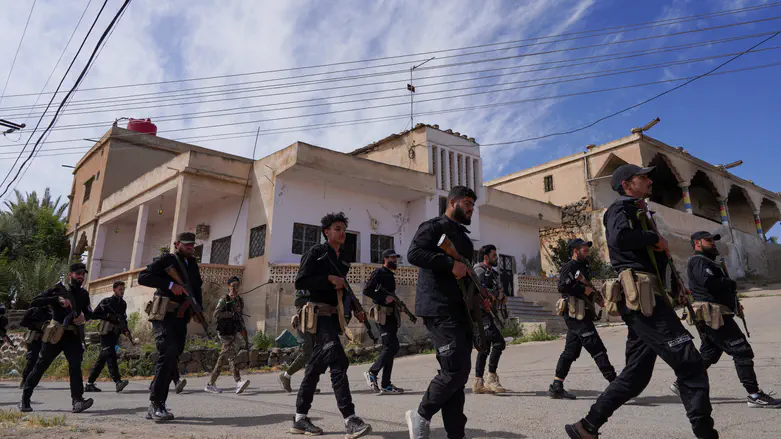The “New Syria” heralded by President Ahmed al-Sharaa is being aggressively marketed to the world as a pragmatic, post-conflict entity ripe for investment. After years of civil war, Damascus is appealing for billions to finance reconstruction, promising a stable, modern state ready for regional integration.
Yet, this vision is a facade. A look inside the new military architecture reveals a shocking reality: the New Syrian Army (NSA) is a hybrid security model that is formally institutionalizing globally blacklisted foreign militants, making the new state an unwitting sponsor of transnational jihad.
Foreign reconstruction capital, primarily from the Gulf and Asia, is now at high risk of funding the permanent infrastructure of future ideological conflict.
The Institutionalization of Extremism
The transition government’s security strategy is based on military consolidation: absorbing disparate rebel forces to replace the former regime’s security apparatus. Crucially, this strategy includes the formal integration of thousands of foreign, ideological fighters into the NSA structure.
The most jarring evidence of this compromise is the 84th Division, a unit designed to house foreign combatants. This division is now home to an estimated 3,500 Uyghur militants, many linked to the Turkestan Islamic Party (TIP), an anti-China organization that Beijing classifies as a terrorist threat. These are not merely rank-and-file soldiers; Uyghur militants have assumed senior Syrian military positions, including the rank of brigadier general and colonels.
This integration transforms a dispersed terrorist problem into a structurally protected, state-affiliated entity. By granting these battle-hardened veterans formal ranks, salaries, and access to state resources, Damascus ensures their loyalty and utilizes their combat expertise. However, the move simultaneously institutionalizes transnational extremism, creating a permanent, protected base of operations for a group committed to waging an insurgency far beyond Syria’s borders.
The Financial Blackmail of the New Patrons
The New Syrian Army is structurally dependent on external funding, a dynamic that has made the country a site of dangerous geopolitical leverage. Every major foreign actor is now forced to negotiate with a regime that holds ideological militants as strategic assets.
China’s Dilemma: The People’s Republic of China (PRC) is a crucial source of reconstruction capital, yet the NSA’s integration of ETIM/TIP militants is a direct threat to Beijing’s interests in Xinjiang and Central Asia. The PRC has explicitly linked its significant economic participation to verifiable counter-terrorism assurances from Damascus. The new Syrian government is thus using the 84th Division as a diplomatic bargaining chip, threatening to unleash or contain the militants in exchange for confirmed, high-value Chinese investment.
The Gulf’s Transaction: Similarly, Saudi Arabia and other Gulf states are pouring conditional capital into Syria to purchase stability-primarily to halt the flow of Captagon (narcotics) and prevent the resurgence of Islamic State remnants. But because TIP/ETIM militants hold key command positions within the NSA, the salaries, fuel, and equipment purchased with legitimate reconstruction money risk inadvertently enhancing the professionalization and logistical capacity of forces that maintain their own ideological, anti-Western goals. The pursuit of transactional peace is funding the operational infrastructure of future jihad.
The Betrayal of the Classroom
The final, critical risk is the long-term ideological project being funded by this foreign capital. The government is not just building a new army; it is attempting to impose a fundamental shift in national identity through the education system.
While the new rulers struggle to earn the trust of Syria’s diverse population, they are pursuing curriculum changes that critics fear will undermine scientific inquiry and establish a rigid Islamic identity. In the classrooms of the New Syria, this ideological shift is stark: children are reportedly seen in morning assemblies repeating declarations, being taught that their constitutional foundation is the Quran, and that their primary national goal is to “liberate the Al-Aqsa Mosque” in Jerusalem.
This is the ultimate betrayal of the reconstruction mandate. Foreign investment, intended to heal trauma and rebuild a secular society, is implicitly underwriting the creation of a generation ideologically mobilized for foreign conflict.
The greatest threat to regional stability is no longer Syria’s collapse, but its successful institutionalization. A stable, unified Syrian army that formally employs a brigadier general from a globally blacklisted militant group is a catastrophic precedent. Unless international partners demand immediate, verifiable disarmament and a transparent, inclusive political process, the world will be paying the ultimate price: funding the ideological foundation of the next war.
Amine Ayoub, a fellow at the Middle East Forum, is a policy analyst and writer based in Morocco. Follow him on X: @amineayoubx
